2024-12-20
Our team draws lessons from three remarkable events in 2024 — Climate Week NYC, the biodiversity conference COP16 in Cali, and the climate change conference COP29 in Baku.
Margaret Rugadya, Darragh Conway, Paola García, Merlyn Hurtado, David Kaimowitz, and Nonette Royo report on what happened and what is needed to unlock greater funding for Indigenous Peoples, Afro-descendant, and local communities to support their work in safeguarding the planet’s ecosystems.
While there has been progress on land tenure and funding access for Indigenous communities, the central message from a hybrid Land Dialogues held at the September Climate Week NYC meeting was that a more ambitious, equitable, and inclusive new pledge for funding will be needed from COP30 in November 2025.
The meeting – co-organised by Tenure Facility with the Ford Foundation and Land Portal – considered the end next November of a £1.7 billion five-year pledge to support the land tenure rights and forest guardianship capabilities of Indigenous Peoples and traditional communities.
It was buoyed by the commitment to a new pledge from Ford Foundation President Darren Walker. Other supporters such as the Bezos Earth Fund, the United Kingdom, Norway, and the United States quickly signalled their support too.
But the point was hammered out that more of the money must go directly to the Indigenous organisations that protect and nurture their land. Only a small fraction is currently doing so.
Myrna Cunningham, an Indigenous rights activist and board member of Tenure Facility, captured the sentiment: “If we are protecting swathes of biodiversity, how do you not have confidence in our decisions?
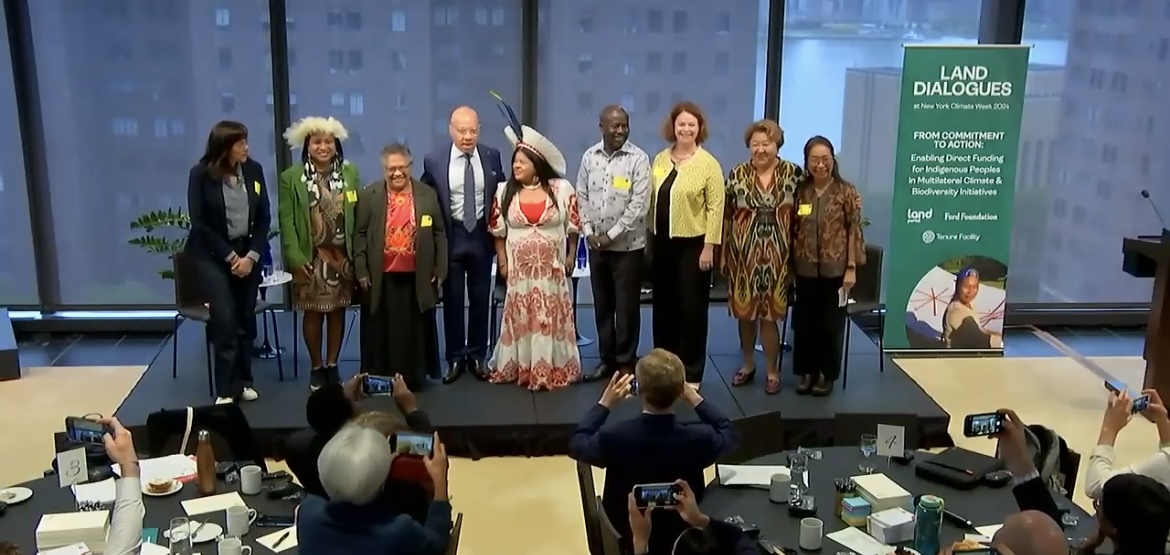
Separately, the Shandia Forum, organised by the Global Alliance of Territorial Communities (GATC), hosted a technical workshop on finance, where Tenure Facility became one of three organizations with The Ford Foundation and The Christensen Fund offering direct granting lessons. Chief Finance Officer Björn Druse shared that in 2023, 77 percent of Tenure Facility’s funds went directly to partner disbursements.
Members of GATC called for Indigenous-led solutions to environmental protection, with direct, accessible funding. Brazil’s Jaguatá Fund and Podáali Fund were presented as promising Indigenous-led financial models and represent the beginning of what is possible with greater trust and funding flowing directly to the frontline through community led funds.
Top of the priority list for Shandia and GATC was setting shared reporting standards and definitions, which is essential for accountability, transparency, and effective tracking of funds directed to local communities. Establishing these standards now could pave the way for a more impactful COP30 and a pledge that truly meets the need.
Meanwhile, the annual Path to Scale meeting – co-hosted by Tenure Facility and Rights and Resources Initiative – addressed localisation efforts by USAID and other donors, aimed at increasing local funding and leadership. Although USAID’s complex structures and reliance on U.S. contractors have historically hindered access for local groups, success stories shared during the meeting demonstrated that reforms and creative solutions can make a real difference.
"By prioritising direct, accountable funding – or working through trusted intermediaries selected by Indigenous and community organisations when needed – we can build systems where Indigenous Peoples and local communities lead the fight against climate change, not only as beneficiaries but as decision-makers."
Localisation is clearly the way forward, but it will require both policy reforms and practical changes to benefit Indigenous Peoples, local communities, and Afro-descendant groups. By prioritising direct, accountable funding – or working through trusted intermediaries selected by Indigenous and community organisations when needed – we can build systems where Indigenous Peoples and local communities lead the fight against climate change, not only as beneficiaries but as decision-makers.
We, as supporters of the global Indigenous Peoples, Afro Descendant Peoples and local communities movement, must come together to facilitate conversations that bring the priorities of frontline defenders to the forefront, with clear examples of how land tenure rights drive effective climate and conservation solutions.
By grounding these efforts in trust, we can ensure that the voices of those on the ground guide the agenda and that donors commit to real and lasting impact.
Margaret Rugadaya and Darragh Conway
The COP16 U.N. Biodiversity Conference held in Cali, Colombia, in late October earned itself the name “COP of the People” because it marked a pivotal moment for Indigenous Peoples, Afro-descendant, and local communities, cementing their essential role in biodiversity conservation efforts.
There were major milestones.
A key one was the establishment of a permanent Subsidiary Body for Indigenous and local communities within the U.N. Convention on Biological Diversity. Approved after intense rounds of negotiations, this body guarantees a sustained voice for Indigenous communities and aligns biodiversity policies with them.
A separate but related decision was approval of the so-called Article 8(j) Work Programme which embeds Indigenous and local leadership into biodiversity efforts through eight core areas—from land tenure security to equitable benefit-sharing. It sets a new standard for conservation by underscoring the need for Indigenous Peoples, Afro-descendant, and local communities to lead in shaping, implementing, and monitoring policies that impact their lands and traditions.
Our Colombian partners, the National Commission of Indigenous Territories (CNTI) and the National Organization of Indigenous Peoples of the Colombian Amazon (OPIAC), were actively involved in the negotiations for 8(j), helping shape it.
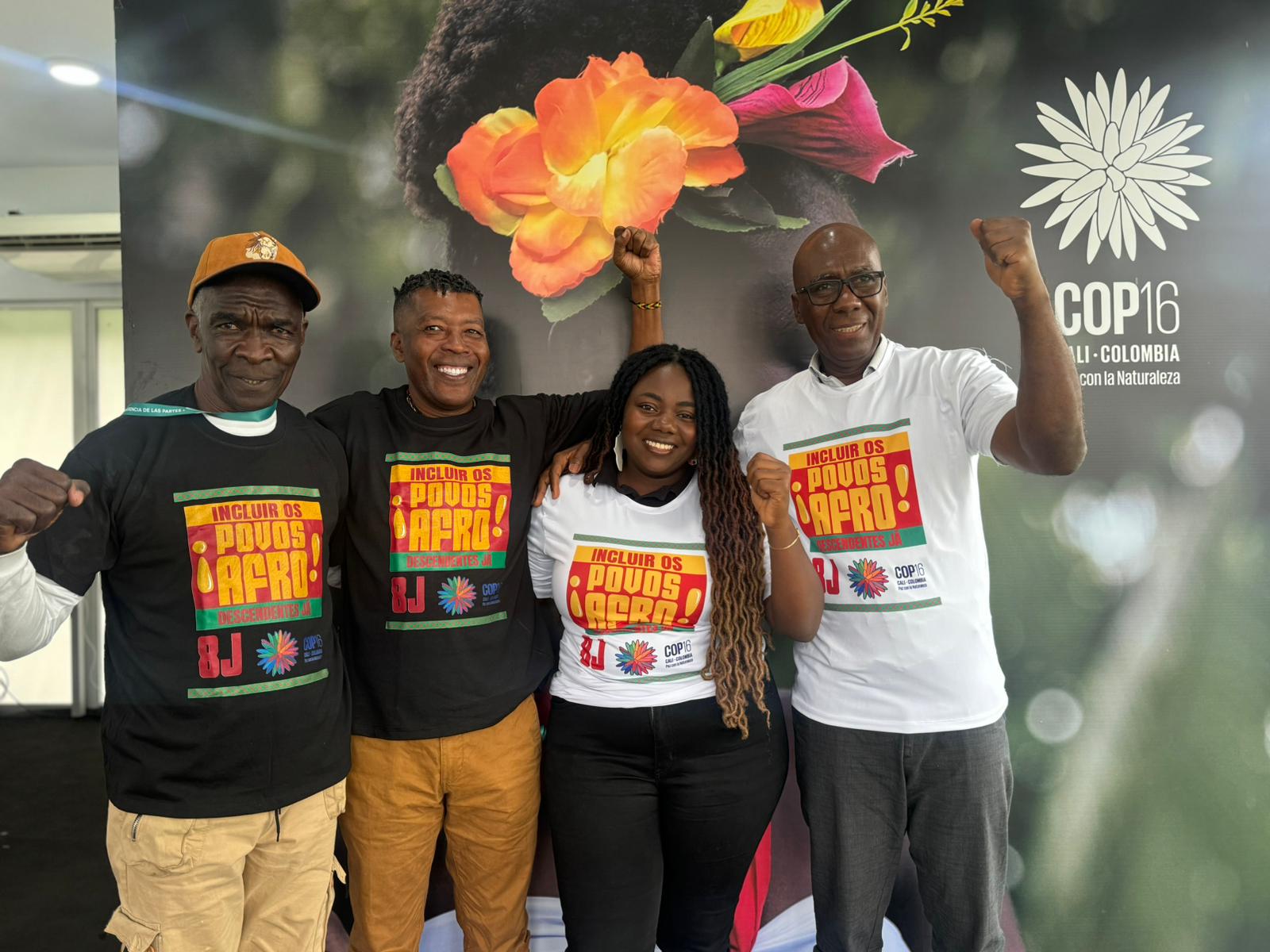
The last day of the conference, meanwhile, made history with the formal recognition of Afro-descendant communities’ crucial role in biodiversity management. This breakthrough, championed by partners, government representatives, civil society, and International Indigenous Forum on Biodiversity negotiators — including Tenure Facility board members Viviana Figueroa and Jennifer Corpuz — was significantly bolstered ahead of COP16 at the Cumbre Global África y su Diáspora, a meeting convened by our partner, Proceso de Comunidades Negras (PCN).
As PCN’s Vladimir Angulo put it: “If we are going to participate in the dialogue, we hope our opinion will be considered. If it is recognised that the stewards of the territories are the people, the other issues can continue to be resolved through dialogue.”
"If we are going to participate in the dialogue, we hope our opinion will be considered. If it is recognised that the stewards of the territories are the people, the other issues can continue to be resolved through dialogue."
The message that peace with nature requires the full inclusion of women resonated strongly, because Indigenous and traditional women’s knowledge and leadership are central to thriving ecosystems and cultural heritage. This was the focus of an event co-hosted by Tenure Facility, International Indigenous Women’s Forum (FIMI), the National Confederation of Indigenous Women of Bolivia (CNAMIB), and Tinta. Women leaders from Brazil, Peru, Bolivia, Ecuador, and Panama shared stories of their struggles and contributions.
The event highlighted calls for secure land rights and formal recognition of women’s roles as biodiversity stewards.
Representatives from UN Women, the Biodiversity Convention Secretariat, and Women4Biodiversity stressed the importance of gender-disaggregated data to shape gender-responsive policies that amplify women’s contributions to governance, conservation, and climate resilience.
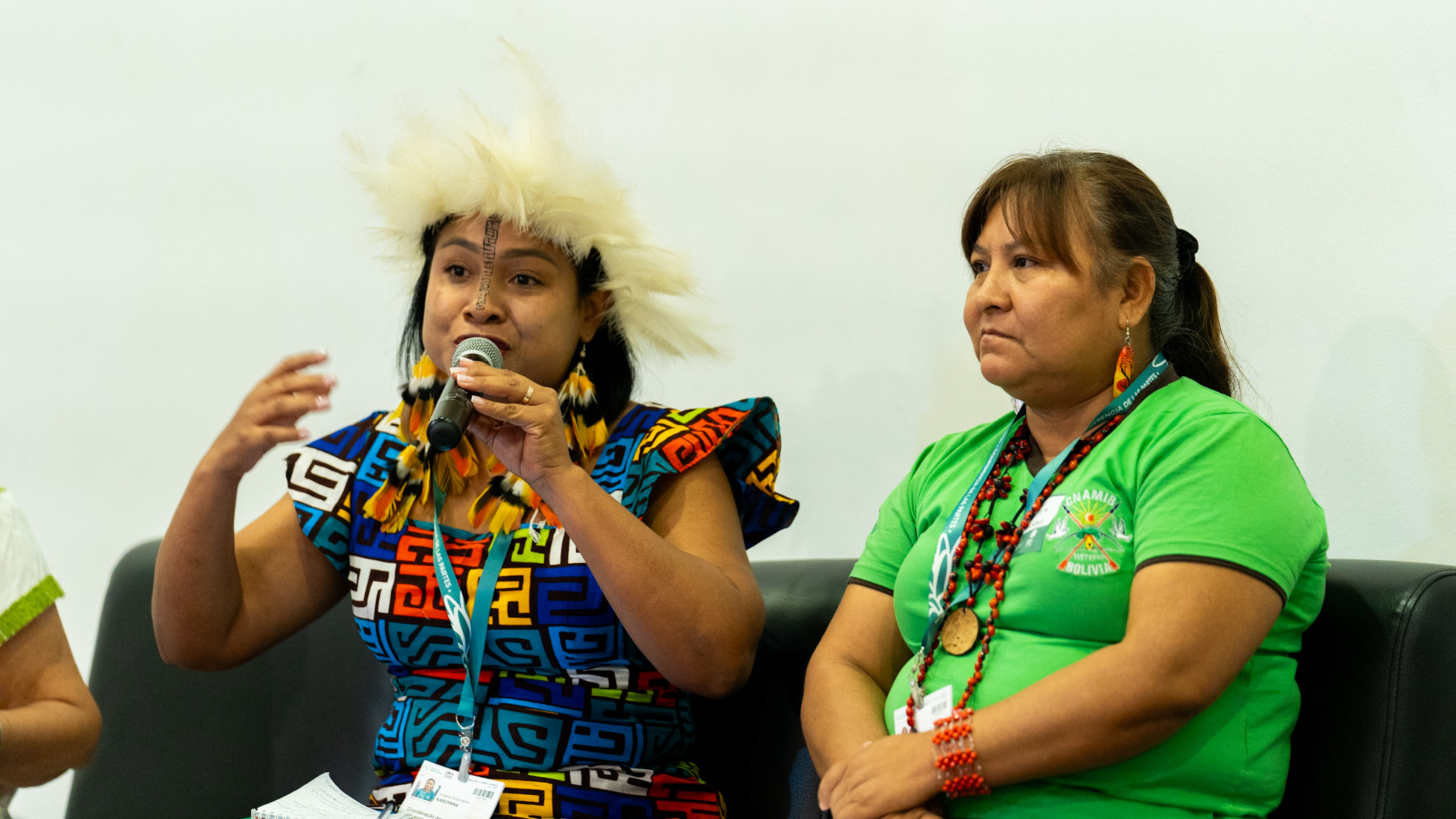
Photo courtesy TV Indigena
Yet another groundbreaking achievement was the creation of the Cali Fund addressing benefit-sharing for genetic resources. By requiring industries to share profits from genetic resources held by Indigenous and other local communities, COP16 established a model for equitable partnerships between knowledge holders and industry.
The fund sets out a new model in advance of climate finance discussions at COP30: fostering fair benefit-sharing that mobilises private finance, while honouring Indigenous, Afro-descendant, and community contributions.
COP16’s hard-negotiated achievements show the path forward. To make lasting progress, local voices must be at the heart of policies.
Jaime Luis Arias, an Indigenous leader from Colombia’s Sierra Nevada, summed it up: “We are territory. It is not [only] how we protect the territory but how the territory protects us.”
Paola García and Merlyn Hurtado
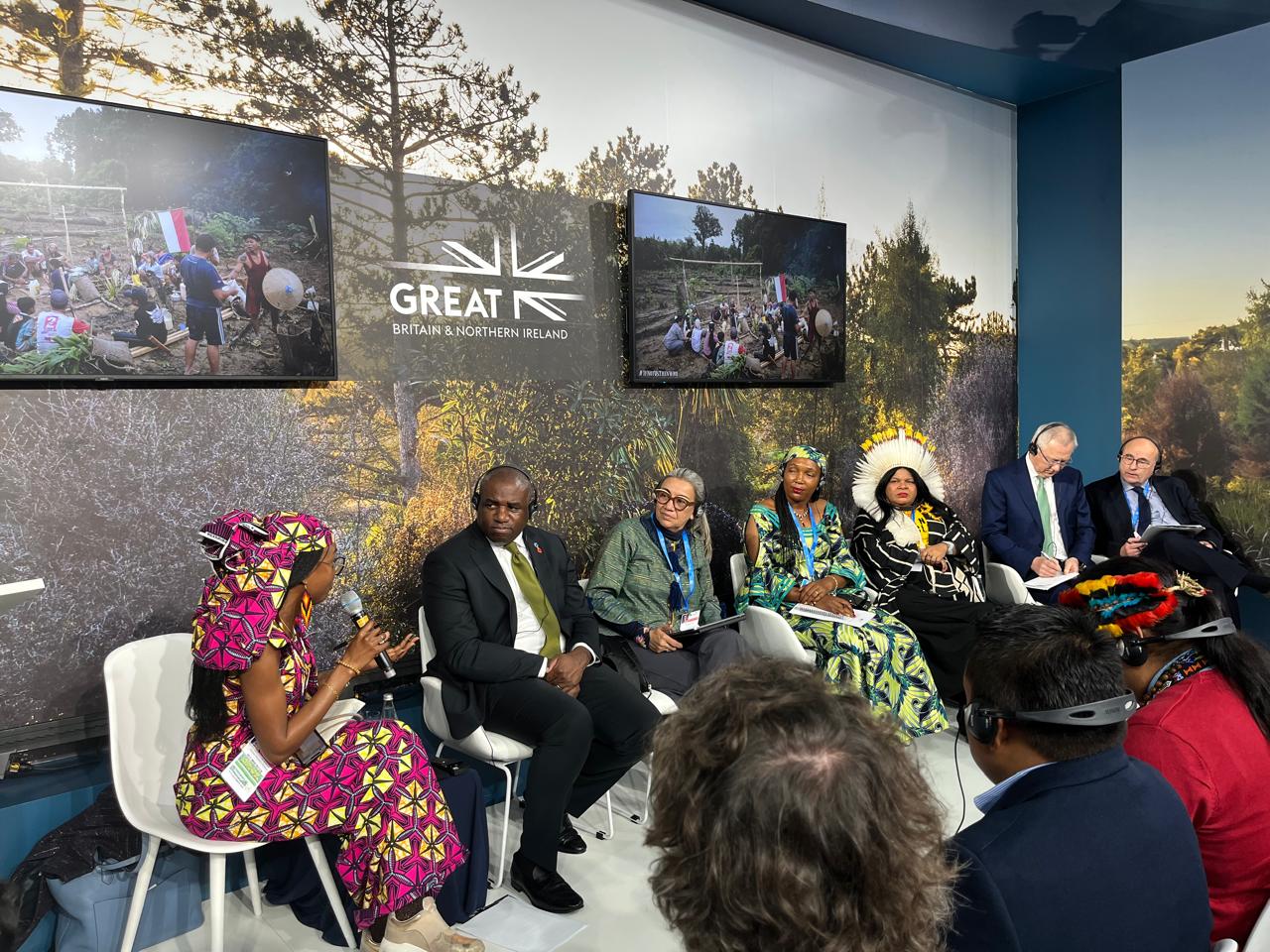
November’s COP29 in Baku demonstrated the energy, increased commitment, and collaboration needed in combatting climate change. Not least among these is to incorporate the vital role of Indigenous Peoples, Afro-descendant, and local communities in driving a just and effective global climate response.
Their traditional knowledge, sustainable practices, and leadership in protecting forests are widely recognised as indispensable in addressing the climate crisis and safeguarding the future of our planet. And it requires secure tenure for forest communities to do that, with more funding at scale.
“This is not charity, this is justice,” said Joan Carling, global director of Indigenous Peoples Rights International, and a member of the Tenure Facility board of directors.
It has been evident since the financial pledges of the 2021 Glasgow COP that Indigenous Peoples and local communities are leading with action and vision. They are sharing their challenges and success stories, organising across regions, and aligning their messages to call for continued commitment to the Glasgow pledge.
What inspires us most is the remarkable unity and synchronisation of Indigenous voices across the globe.
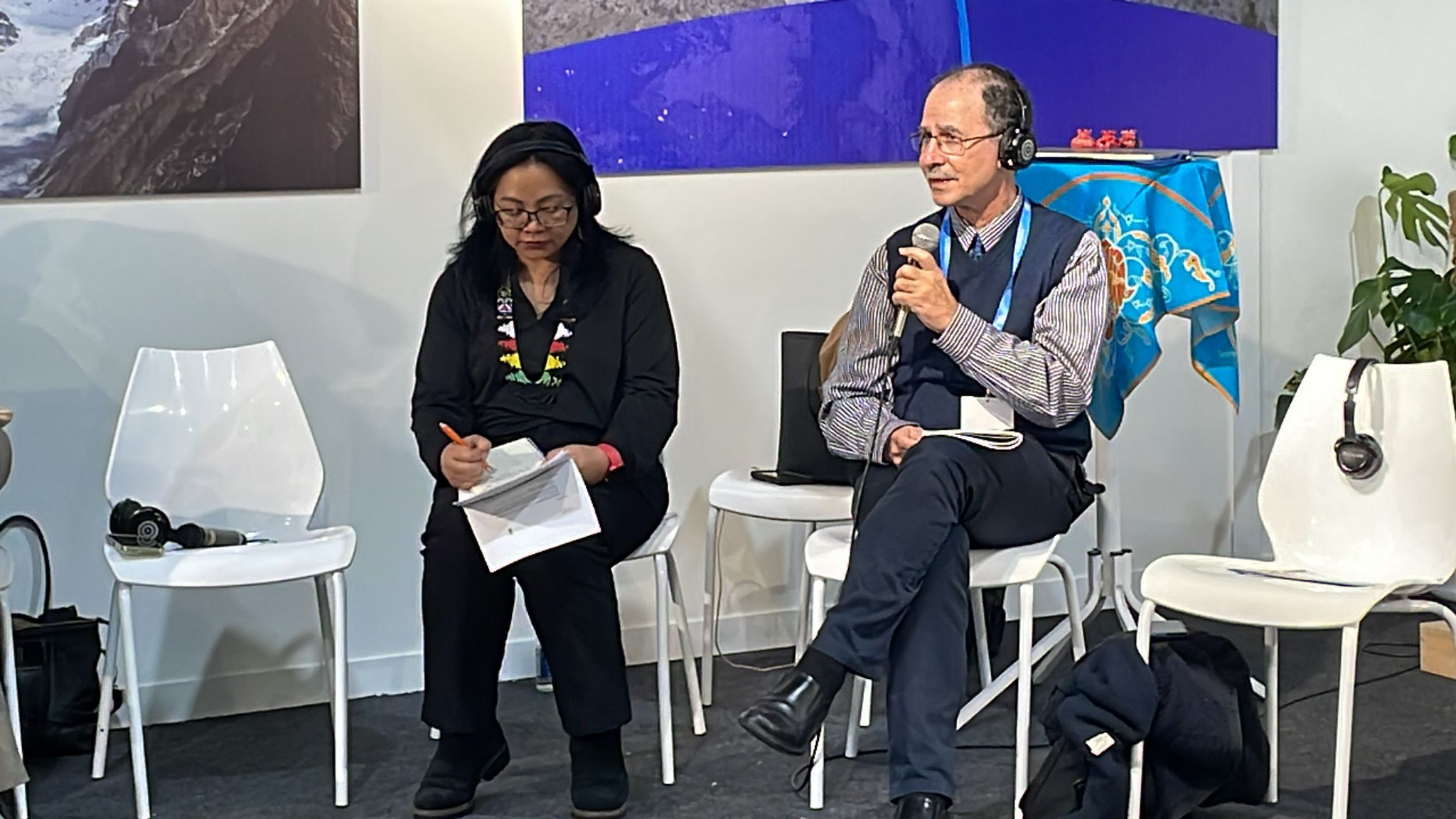
Collaborative initiatives like the Forest Tenure Funders Group and the Forest and Climate Leaders’ Partnership have played a crucial role in advancing these efforts. Combining governmental and philanthropic support, these groups are fulfilling accountability goals from Glasgow by prioritising Indigenous land rights as a foundation for biodiversity protection and climate action.
The High-Level Climate Champions have been incredibly impactful in engaging Indigenous Peoples more effectively within the Marrakech Partnership and Global Action Agenda, lending their platform to the global Indigenous Peoples movement.
Alongside various action events, high level roundtables, and implementation labs at COP29, the Race to Resilience campaign has also raised the profile of Indigenous Peoples contribution to adaptation and resilience-building. This year, Tenure Facility joined the Race to Resilience’s effort to increase the resilience of 4 billion people, as its newest partner. The Tenure Facility’s partnership underscores how securing land rights strengthens broader policy frameworks, financing, and decision-making essential to combating the climate crisis.
"COP30 is more than just the next step; it is a turning point. The decisions made there will influence the trajectory of global climate work for decades."
Looking ahead, COP30 in Belém offers a truly extraordinary opportunity. As the first COP to take place in the Amazon, hosted by a country with a dedicated minister of Indigenous Peoples, it is not just a moment to discuss climate issues, it is a chance to continue valuing secure land tenure as key to a more effective and ambitious climate response.
It represents an unparalleled platform to elevate Indigenous leadership, prioritise Indigenous Peoples’ contributions, and ensure their voices and solutions shape the course of climate action for years to come.
COP30 is more than just the next step; it is a turning point. The decisions made there will influence the trajectory of global climate work for decades. We must seize this unparalleled moment to ensure that the leadership, rights, and solutions of Indigenous Peoples, Afro Descendant Peoples and local communities are fully integrated into the global climate response.
Nonette Royo and David Kaimowitz
Articles